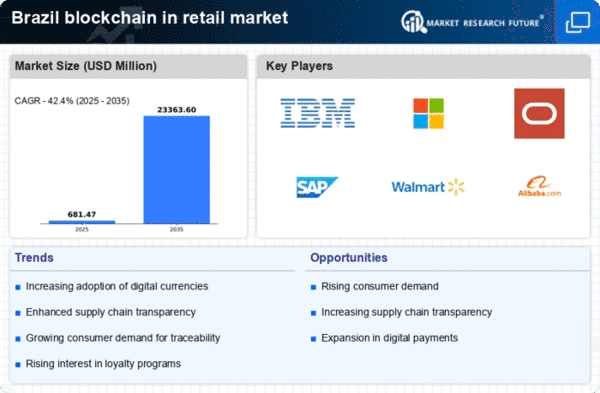Rising Demand for Traceability
The increasing consumer demand for product traceability is a pivotal driver in the blockchain in-retail market. In Brazil, consumers are becoming more conscious of the origins of their products, particularly in sectors such as food and fashion. This trend is prompting retailers to adopt blockchain technology to provide transparent supply chain information. According to recent studies, approximately 70% of Brazilian consumers express a preference for brands that offer clear traceability. By leveraging blockchain, retailers can ensure authenticity and quality, thereby enhancing consumer trust. This shift towards traceability not only meets consumer expectations but also aligns with regulatory requirements, as Brazil's government emphasizes food safety and quality standards. Consequently, the integration of blockchain technology is likely to become a standard practice in the retail sector, fostering a more transparent and accountable marketplace.
Innovation in Payment Solutions
The evolution of payment solutions is a significant driver in the blockchain in-retail market, particularly in Brazil, where digital payment adoption is on the rise. Blockchain technology facilitates innovative payment methods, such as cryptocurrency transactions and decentralized finance (DeFi) solutions, which appeal to tech-savvy consumers. As Brazilian consumers increasingly embrace digital wallets and contactless payments, retailers are compelled to adapt to these trends. The potential for lower transaction fees and faster settlement times associated with blockchain payments is particularly attractive in a market characterized by high transaction costs. Reports indicate that the adoption of blockchain-based payment solutions could reduce transaction fees by up to 50%. This innovation not only enhances the shopping experience but also positions retailers to capitalize on the growing demand for efficient and secure payment options.
Consumer Trust and Brand Loyalty
Building consumer trust is a fundamental driver for the blockchain in-retail market, especially in Brazil, where brand loyalty is increasingly influenced by transparency and ethical practices. Retailers that adopt blockchain technology can provide verifiable information about their products, which resonates with consumers who prioritize ethical sourcing and sustainability. Studies suggest that brands demonstrating transparency can enhance customer loyalty by as much as 25%. In a market where consumers are becoming more discerning, the ability to showcase product authenticity through blockchain can differentiate retailers from their competitors. This focus on trust not only fosters brand loyalty but also encourages repeat purchases, ultimately contributing to long-term business success in the Brazilian retail landscape.
Cost Reduction through Efficiency
Cost efficiency remains a critical driver for the blockchain in-retail market, particularly in Brazil's competitive retail landscape. Retailers are increasingly seeking ways to reduce operational costs while maintaining quality and service levels. Blockchain technology offers the potential to streamline processes, reduce fraud, and minimize errors in transactions. For instance, by automating inventory management and payment processes through smart contracts, retailers can significantly lower administrative costs. Reports indicate that businesses utilizing blockchain can reduce transaction costs by up to 30%. This financial incentive is compelling for Brazilian retailers, who face tight margins and rising operational expenses. As the market evolves, the adoption of blockchain solutions is expected to accelerate, driven by the need for cost-effective operations and improved profitability.
Regulatory Compliance and Security
Regulatory compliance is an essential driver influencing the blockchain in-retail market in Brazil. The Brazilian government has been proactive in establishing regulations that govern data protection and consumer rights. Blockchain technology offers a robust framework for ensuring compliance with these regulations, particularly in terms of data security and transaction integrity. By utilizing blockchain, retailers can create immutable records that enhance accountability and traceability, which are crucial for meeting regulatory standards. Furthermore, the decentralized nature of blockchain reduces the risk of data breaches, a growing concern in the retail sector. As Brazilian retailers navigate complex regulatory landscapes, the adoption of blockchain solutions is likely to increase, providing a secure and compliant method for managing transactions and consumer data.
















